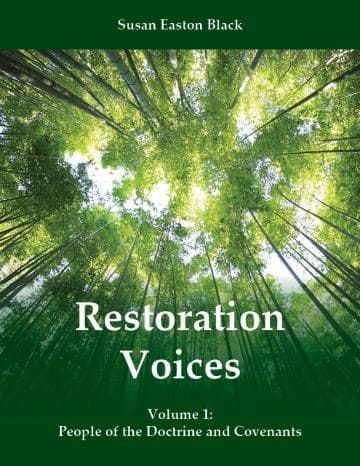Book
135 Chapters

With the financial gift of a thousand dollars from Stephen Mack and his partner, John Mudget, and Asael Smith’s gift to his son of part ownership in a farm, newlyweds Joseph Smith Sr. and Lucy Mack Smith began life together in comfortable circumstances. For six years they were part of the vibrant farming economy of Tunbridge, Vermont. Believing it possible to advance their fortunes by living in nearby Randolph, they rented their farm and moved to Randolph where Joseph became a merchant, selling goods purchased on credit from Boston dealers. The goods sold with ease but not for cash. A typical sale carried with it promises of payment in foodstuffs after a bounteous harvest. In need of cash, Joseph Sr. began crystallizing ginseng root for profit. He entered into a contractual agreement to ship his ginseng to China on consignment. Deception, theft, and outright lies destroyed his hopes of success and his financial base.
Joseph worked on farmland near the Connecticut River and supplemented his income by teaching school, all in hopes of bettering his economic circumstances. The prospect of prosperity eluded him, however. Newspapers in Vermont targeted families like the Smiths with luring advertisements of available land in western New York. In 1816 Joseph Sr. journeyed to Palmyra to see the touted land. Lucy and the children soon followed.
The Smiths worked hard to achieve financial stability in Palmyra. Joseph Sr. worked as a common laborer and operated a shop on Palmyra’s Main Street and sold gingerbread, pies, boiled eggs, and root beer to paying customers. In 1818 he and his son Alvin contracted for a 100-acre farm in Manchester. On that property in 1823 Joseph Jr. was directed by the angel Moroni to tell his father of the heavenly message he had received and promised, “He will believe every word you say to him.” In response to his son’s account of the angel and gold plates, Joseph Sr. declared, “My son, be not disobedient to this heavenly vision!”[1]
Joseph Sr. became one of Eight Witnesses of the Book of Mormon who saw the plates and the engravings on them, “all of which has the appearance of ancient work, and of curious workmanship.”[2] When imprisoned for a $14 note of indebtedness and promised freedom if he would renounce the Book of Mormon, Father Smith thought of the Apostle Paul and said to himself, “I was not the first man who had been imprisoned for the truth’s sake; and when I should meet Paul in the Paradise of God, I could tell him that I, too, had been in bonds for the Gospel which he had preached.”[3]
On April 6, 1830, following the foundational meeting of what became The Church of Jesus Christ of Latter-day Saints, Joseph Sr. was baptized. “Praise to my God!” said his son Joseph, “that I lived to see my own father baptized into the true Church of Jesus Christ!”[4] Following his baptism, Joseph Sr. and his family gathered with the Saints in Kirtland, Ohio. On December 18, 1833, his son Joseph pronounced a blessing upon his head, saying “Blessed of the Lord is my father, for he shall stand in the midst of his posterity . . . and shall be numbered among those who hold the right of Patriarchal Priesthood.”[5]
At age 64 Joseph Sr., accompanied by his brother John Smith, journeyed nearly twenty-four hundred miles throughout the eastern states sharing the message of the Restoration and strengthening fledgling Church branches. After returning to Kirtland, the brothers moved their families to Missouri. When the Prophet Joseph was taken prisoner outside of Far West, Missouri, in October 1838, Joseph Sr. and his wife, Lucy, heard him scream. “Not knowing the cause, we supposed they were murdering him,” wrote Mother Smith. “Soon after the screaming commenced, five or six guns were discharged. At this, Mr. Smith [Joseph Sr.], folding his arms tight across his heart, cried out, ‘Oh, my God! my God! they have murdered my son! they have murdered him! and I must die, for I cannot live without him!’” [6]
Family tradition purports that Joseph Sr. never afterwards entirely recovered. As he lay on his deathbed in Nauvoo, Illinois, in 1840, family members were invited to receive a blessing from him. Joseph Sr. promised his son Joseph, “You shall even live to finish your work.” Joseph Jr. wept and asked, “Oh! my father, shall I? ‘Yes,’ said his father, “you shall live to lay out the plan of all the work which God has given you to do. This is my dying blessing upon your head in the name of Jesus.’”
After blessing other children and his wife, Lucy, Joseph Sr. said, “I can see and hear, as well as ever I could.” After a long pause he exclaimed, “I see Alvin. I shall live seven or eight minutes.” Mother Smith wrote, “In about eight minutes his breath stopped. . . . He departed so calmly, that, for some time, we could not believe but that he would breathe again.”[7]
[1] Lucy Mack Smith, History, 1844–1845, Page [11], bk. 3. Joseph Smith Papers.
[2] The Testimony of Eight Witnesses in the Book of Mormon.
[3] Lucy Mack Smith, History, 1845, 185. Joseph Smith Papers.
[4] Lucy Mack Smith, History, 1844–1845, Page [12], bk. 9.
[5] Appendix 5, Document 1. Blessing to Joseph Smith Sr. and Lucy Mack Smith, between circa 15 and 28 September 1835. Joseph Smith Papers.
[6] Lucy Mack Smith, History, 1845, 279.
[7] Lucy Mack Smith, History, 1845, 298–301.
Book
135 Chapters
Items in the BMC Archive are made publicly available for non-commercial, private use. Inclusion within the BMC Archive does not imply endorsement. Items do not represent the official views of The Church of Jesus Christ of Latter-day Saints or of Book of Mormon Central.